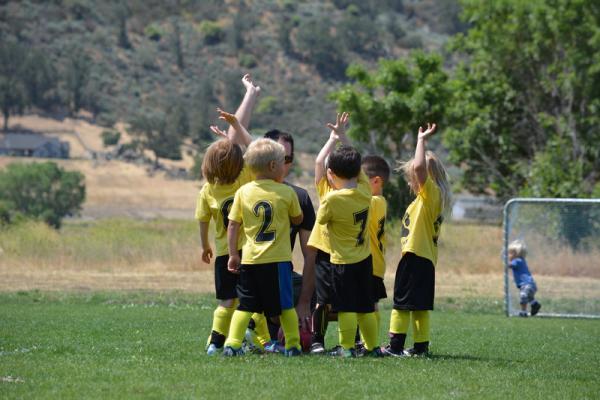
As parents and mentors, we encourage our children to create goals and dreams. Many parents decide to enroll their children in organized sports because it is a great way to develop communication and problem-solving skills. Not to mention, exercise is a great way for children to burn off energy and stay healthy. The benefits of sports go beyond the physical aspect. Children who are involved in sports and group activities tend to have more self-confidence, higher self-esteem, the ability to persevere in challenging situations and are generally more cooperative. But, what do you do when your child is over the demanding schedule of year-round sports? How can you help your child avoid getting burned out?
Let’s face it, sometimes the things we enjoy can feel like a chore if we’re not conscious about the commitment. Burnout can mean your child needs a change, realizes they love the sport less as the demands are increased, or the normal stresses of life are taking a toll. It’s important to remember that in sports, burnout is a combination of physical and emotional exhaustion. Burnout is not a sign of weakness.
Here’s what we’ve found to be helpful:
Try to maintain balance.
Burnout usually occurs when an individual is doing the same thing repeatedly, and the reward isn’t clear. For children playing sports, this may be the case when their team isn’t winning, practices are stressful and long, or a change in the weather. Signs that indicate balance may be compromised could be mood swings, mental fatigue, apathy, or general staleness with the sport. Even though your child may be inclined to quit, it is important to recognize the imbalance and try to fix it. Some options to regain balance could look like:
- Asking the coach for a day off from practice and opting to do something fun with your child.
- Selecting an activity or exercise that will allow your child to free their mind from the sport. This could be cooking, reading a new book, or taking a walk together.
Take a break in the off-season.
In every sport, there are natural gaps, and the required conditioning during those breaks can feel somewhat overwhelming. To stay fresh and take a real break, encourage your child to try out different conditioning. If your kid is bored with the regular conditioning regiment, they may become burned out. Talk with their coach or a trainer and see what new exercises they can try.
However, allow your child to take an actual break. You have probably heard the saying, “Absence makes the heart grow fonder.” Well, it’s totally true! Sometimes a break is what our mind and body need in order to feel rejuvenated enough to give something our all – sports are included in that mix.
Eliminate the pressure.
Be honest with yourself. Are you living vicariously through your child athlete? Are you pushing your child to master this sport and the techniques? If you said yes, it is time to let go and eliminate the pressure you’re applying on your child.
While it is okay and perfectly normal to be proud of your child’s sports success, it’s not healthy to impose an unfair amount of pressure on them to succeed and take away the fun they could be having.
Parents can encourage children without being overbearing and forceful. Try to take a step back and be supportive and not so critical. Odds are your child is already feeling pressure from their coach and teammates; so, the last thing your child needs is your added pressure.
Consider changing teams and coaches.
Switching teams and/or coaches can be a natural needed progression in your child’s sports life. If your child is not meshing well with the team or coach, consider making a move. Obviously, don’t be impulsive and switch without giving the situation a chance to work; however, some coaches are not effective with some children. Sports are meant to be a way for your child to grow and develop, but if they’re not able to do that, then it is worthwhile to consider making a change to eliminate a potential burnout.
Think about it; there is a reason why teachers teach a certain grade and why coaches specialize within a certain age group. New views and values are a great way to incorporate growth within your child’s mindset and a natural way to avoid burnout.
Develop a powerful support group.
Children need a support network in order to stay motivated and experience less burnout. This support group can be other parents on the team, teachers, or family members. It is important for your child to have people who they can openly discuss setbacks and goals with. Children appreciate the support from their parents, but they also need to receive encouragement from other people. Community is very important when it comes to sports.
Burnout is a real thing! It is often confused and associated with depression and laziness, but burnout is its own thing. Some of the most successful professional athletes experience burnout – that is why there are off-seasons. It is important for parents and mentors to recognize the importance of a mental and physical break. Even though your young athlete is successful in their sport, that doesn’t mean they have to live and breathe that every day. Try to make room for fun outside of their year-round sport.

